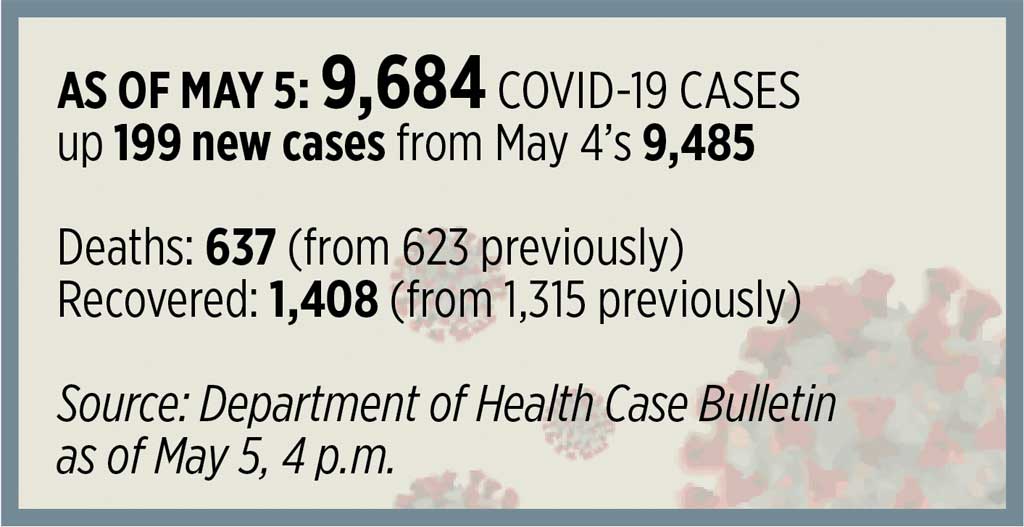By Rosemarie F. Marquez
WHEN a Philippine Army soldier brought food packs to Rowena P. dela Cruz’s doorstep one Saturday afternoon in April, tears streamed down her face.
“Finally, we have food for our children,” said the 29-year-old housewife. Her family of six lives in a 20-square-meter dwelling in Navotas City, northwest of the capital Manila. “We were so happy, as well as all our neighbors. The relief goods were a big blessing to us, especially since my husband is a passenger jeepney driver and he can’t work now, so we don’t know where to get money for food.”
The previous day, Mrs. Dela Cruz, her husband, Federico, and her 70-year-old father-in-law who lives with them and has a lung ailment, had skipped dinner, lunch, and breakfast. Her three children, including an infant, had consumed only milk and bread. Her husband had to give up his job temporarily when enhanced community quarantine (ECQ) started in Metro Manila on March 16. The ECQ is one of the government’s emergency measures to stop the spread of COVID-19 and save lives.
RESPONDING TO THE COVID-19 HEALTH CRISIS
The Dela Cruz family is just one of tens of thousands of poor Filipino households who have received food supplies under the Bayan Bayanihan, a food program launched by the Asian Development Bank (ADB) in partnership with the Department of Social Welfare and Development (DSWD) and the private sector, in coordination with the Philippine Army.
Bayan Bayanihan, based on the traditional Filipino bayanihan principle of community spirit, was funded through a $5 million technical assistance under the Rapid Emergency Supplies Provision project approved by the ADB on March 26. The project addresses the health crisis caused by COVID-19 by delivering critical food supplies to as many as 140,000 vulnerable households in Metro Manila and neighboring provinces. Target beneficiaries are the poor and marginalized, including people with disabilities and the elderly, as well as daily wage earners in the informal labor market.
“We felt strongly that we had to play our part during these extraordinary times to immediately help the poor and vulnerable groups,” said ADB’s Director General for Southeast Asia Ramesh Subramaniam, who led Bayan Bayanihan. “At the same time, we worked with the government to rapidly prepare our broader support for the country’s fiscal stimulus programs and social protection initiatives.”
A COORDINATED RESPONSE
Mr. Subramaniam said the program was designed to complement national and local governments’ immediate efforts to provide for the basic needs of Filipinos, especially those living in relatively remote areas or far from retail facilities or food markets.
ADB’s approval of the project spurred a rush of online coordination meetings that went late into the night. Hundreds of phone calls were made between program partners including the private sector. Systems and procedures were immediately put in place for the emergency distribution of food supplies.
ADB staff led the food procurement and distribution schedules, and worked with the DSWD to identify the neediest communities. The Philippine Army deployed more than 400 soldiers and civilians to distribute and pack the goods into canvas bags, each containing 35 cans of sardines, tuna flakes, corned beef, and other items.
HELP FOR THE MOST IN NEED
Assembled in line with DSWD specifications, the food packs and accompanying 10-kilogram sacks of rice can sustain a family of five for a week. Soldiers, together with DSWD representatives, visited target communities days before distribution to validate poverty data and coordinate with village captains and social workers to ensure the smooth flow of goods from army trucks to doorsteps.
On March 31, five days after the project approval, Philippine Army trucks rolled out of Army headquarters in Taguig City with rice for 2,000 target households in four cities in Metro Manila — Pasay, Caloocan, Quezon, and Manila. On April 4, Army trucks started going deep into hard-to-reach barangays or villages, delivering 4,613 food packs to residents of Barangay Hulong Duhat in Malabon City. E-tricycles and bicycle taxis were hired to take the food packs to residents who lived down narrow alleyways, allowing them to abide by government guidelines to limit movement outside their homes.
100,000 POOR HOUSEHOLDS REACHED
By April 30, around 100,000 poor households, or half a million people, from all over Metro Manila had received food packs, including people with disabilities in Caloocan City. Contributions from large private sector and philanthropic partners, such as the Philippine Disaster Relief Foundation and Philippine Chamber of Commerce and Industry enabled the distribution to at least 40,000 more households. The program will end in May.
“We had other groups doing the same thing, but what made ADB’s program of Bayan Bayanihan really matter was the fact that we had a decision to give more,” said Ambassador Marciano Paynor, Jr., a seasoned diplomat and former Chief of Presidential Protocol who helped organize coordination systems for the program. “We are reaching out to the poorest of the poor. We are able to alleviate their hunger. And with this extended ECQ, then all the more you see the importance of having given them the amount that we gave and the places we have been to.”
Aleli Mantequilla, a 39-year-old who works at a biscuit factory and whose nine-year-old son is a person with disability, said the food packs allowed them to stay at home in Caloocan City.
“It is enough for at least two weeks, so we need not go out of the house during this time when it is so dangerous for our health, especially since my son cannot get sick. The food supplies also gave us some peace of mind. We can reallocate our money for paying house bills which are sure to come after the quarantine is lifted,” Ms. Mantequilla said
INSPIRATION AND STRENGTH IN PARTNERSHIP
Lieutenant General Gilbert Gapay, Philippine Army chief, said the program also employed as packers 250 students and caddies working at the Philippine Army golf course who had lost their jobs during the quarantine.
“They work on rotation in batches of 50 to 60, so that all of them will have income,” said General Gapay. “So apart from addressing the socio-economic impact of COVID-19 to poor communities, the program is also helping individuals who lost their jobs. We thank ADB for that.”
Despite risks to their health as frontline workers of the food program, Philippine Army and Navy personnel toiled almost daily to pack and bring food supplies to neighborhoods.
“We derive satisfaction and fulfillment out of helping these poor people, the needy,” General Gapay said. “We also draw inspiration and strength knowing that we have staunch partners willing to serve, like ADB.”
Rosemarie F. Marquez is a Senior External Relations Officer of the Philippines Country Office of the Asian Development Bank


